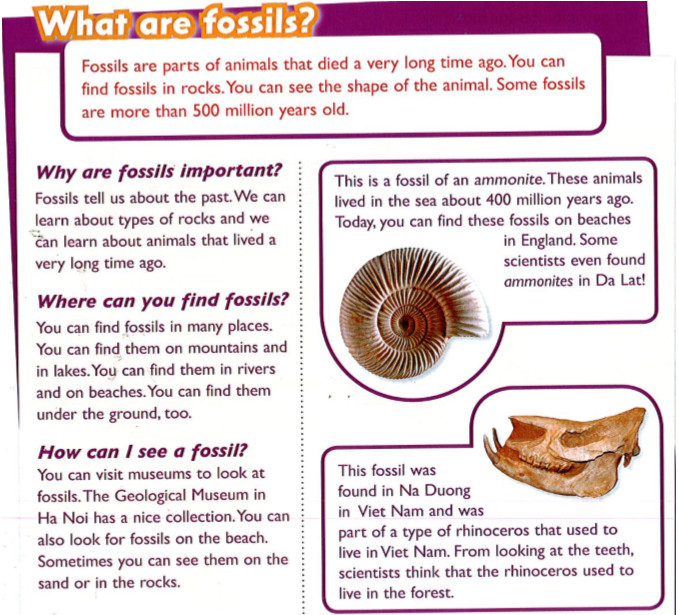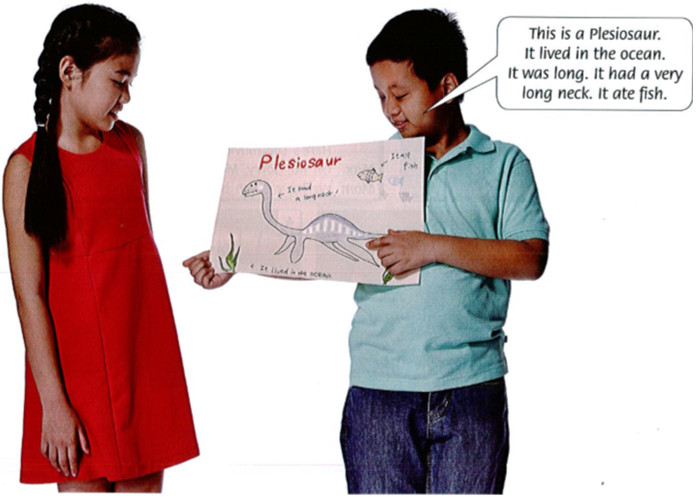1. Describe the pictures. What do you know about fossils?
2. Read.

What are fossils?
Fossils are parts of animals that died a very long time ago. You can find fossils in rocks. You can see the shape of the animal. Some fossils are more than 500 million years old.
Why are fossils important?
Fossils tell us about the past. We can learn about types of rocks and we can learn about animals that lived a very long time ago.
Where can you find fossils?
You can find fossils in many places. You can find them on mountains and in lakes. You can fine them in rivers and on beaches. You can find in rivers and on beaches. You can find them under the ground, too.
How can I see a fossil?
You can visit museums to look at fossils. The Geological Museum in Ha Noi has a nice collection. You can also look for fossils on the beach. Sometimes you can see them on the sand or in the rocks.
This is a fossil of an ammonite. These animals lived in the sea about 400 million years ago. Today, you can find these fossils on beaches in England. Some scientists even found ammonites in Da Lat!
This fossil was found in Na Duong in Viet Nam and was part of type of rhinoceros that used to live in Viet Nam. From looking at the teeth, scientists think that the rhinoceros used to live in the forest.
Dịch:
Hóa thạch là gì?
Hóa thạc là một phần của động vật đã chết cách đây rất lâu. Bạn có thể tìm thấy hóa thạch trong đá. Bạn có thể nhìn thấy hình dạng của con vật. Một vài hóa thạch có cách đây 500 triệu năm.
Tại sao hóa thạch lại quan trọng?
Hóa thạch nói cho chúng ta biết về quá khứ. Chúng ta có thể hiểu biết về các loại đá và chúng ta có thể biết về những con vật đã sống cách đây rất lâu.
Bạn có thể tìm thấy hóa thạch ở đâu?
Bạn có thể tìm thấy hóa thạch ở nhiều nơi. Bạn có thể tìm thấy chúng trên núi và trong hồ. Bạn có thể tìm thấy chúng ở sông hoặc biển. Bạn cũng có thể tìm chúng dưới mặt đất.
Làm thế nào mới nhìn thấy một hóa thạch?
Bạn có thể đến bảo tàng để xem hóa thạch. Bảo tàng Địa Chất Hà Nội có thu thập. Bạn cũng có thể tìm kiếm hóa thạch ở bãi biển. Thỉnh thoảng bạn có thể nhìn thấy chúng ở trên cát hoặc trong đá.
Đây là một hóa thạch vỏ ốc hóa đá. Có nhiều động vật đã sống dưới biển khoảng 400 triệu năm trước. Ngày nay, bạn có thể tìm thấy những hóa thạch này trên bãi biển ở Anh. Một vài nhà khoa học còn tìm thấy hóa thạch vỏ ốc ở Đà Lạt!
Hóa Thạch này được tìm thấy ở Na Dương Việt Nam và một phần của loài tê giác đã sống ở Việt Nam. Từ hàm răng, các nhà hoa học nghĩ rằng tê giác sống trong rừng.
3. Read again. Where did they find the fossils in the pictures?
Advertisements (Quảng cáo)
Hướng dẫn giải:
They find the fossils on beaches in England, in Da Lat and Na Duong in Viet Nam.
4. Read again and answer.
1. What are fossils?
2. How old are some fossils?
3. What can we learn from fossils?
4. Where can we find fossils?
5. Where did scientists find the ammonites in Viet Nam?
6. Where did the rhinoceros use to live?
Hướng dẫn giải:
1. Fossils are parts of animals that died a very long time ago.
2. Some fossils are more than 500 million years old.
3. We can learn abour types of rocks and we can learn about animals that lived a very long time ago.
4. We can find fossils in many places. We can find them on mountains and in lakes. We can fine them in rivers and on beaches. We can find in rivers and on beaches. We can find them under the ground, too.
5. Some scientists found ammonites in Da Lat.
6. Rhinoceros used to live in the forest.
5. Ask and answer.
1. Would you like to find a fossil? Why?
2. Do you like learning about the past? Why?

1. Yes. Because I can learn about types of rocks and I can learn about animals that lived a very long time ago.
2. Yes, I do. Because I can learn many things.
6. Draw of find a picture of an animal that lived in the past. Talk about it.

